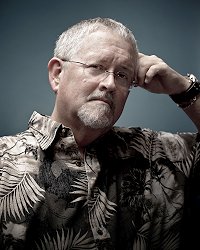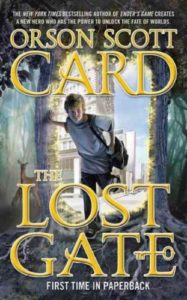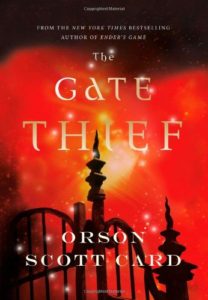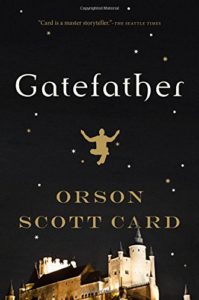Podcast: Play in new window | Download | Embed
Subscribe: Apple Podcasts | Spotify | Amazon Music | Email | TuneIn | RSS | More
The second half of a two-hour conversation with Orson Scott Card about his creative process. Part 2 focuses more on his recent Mithermages fantasy series.
The Introduction:

Orson Scott Card is the author of the novels Ender’s Game, Ender’s Shadow, and Speaker for the Dead, which are widely read by adults and younger readers, and are increasingly used in schools. His most recent series, the young adult Pathfinder series (Pathfinder, Ruins, Visitors) and the fantasy Mithermages series (Lost Gate, Gate Thief, Gatefather) are taking readers in new directions.
Besides these and other science fiction novels, Card writes contemporary fantasy (Magic Street, Enchantment, Lost Boys), biblical novels (Stone Tables, Rachel and Leah), the American frontier fantasy series The Tales of Alvin Maker (beginning with Seventh Son), poetry (An Open Book), and many plays and scripts, including his “freshened” Shakespeare scripts for Romeo & Juliet, The Taming of the Shrew, and The Merchant of Venice.
Card was born in Washington and grew up in California, Arizona, and Utah. He served a mission for the LDS Church in Brazil in the early 1970s. Besides his writing, he teaches occasional classes and workshops and directs plays. He frequently teaches writing and literature courses at Southern Virginia University.
Card currently lives in Greensboro, North Carolina, with his wife, Kristine Allen Card, where his primary activities are writing a review column for the local Rhinoceros Times and feeding birds, squirrels, chipmunks, possums, and raccoons on the patio.
Website: www.hatrack.com
Twitter: @orsonscottcard
Orson Scott Card’s Amazon page
The Show:
Returning to the discussion of how theatrical experience contributes to his writing, Card says writing is much like directing actors on stage: you have a kind of top-down map in your head, almost like the way football plays (is it an accident they’re called plays) are marked with Xs and Os. “The difference is, in a football game you have no control over what the other team does, while in a play you control everybody.”
Card notes he does very little description—just enough to make the setting clear. Ultimately, he notes, a play rises and falls on what the audience hears, on the dialogue and how it’s delivered.
Fiction “is a play the readers put on by themselves” he says. If there’s a wrong way say a line, an actor will find a way to do it, so playwrights have to learn to actor-proof their lines. Readers can also read a line the wrong way, so again, it has to be reader-proofed. If the author doesn’t do that, the reader will misread and get lost.
The greatest teacher of this kind of clarity was a man who never wrote a play in his life, as far as Card knows: Isaac Asimov, a man who wrote a un-put-downable, thick, two-volume autobiography of a life in which nothing happened.
Card said he read that autobiography, staying up all night, and in the end though Asimov gets no credit for being “the finest writer of prose in the history of the English language. No one has ever done what we call the American plain style better than Isaac Asimov.”
In an Asimov story, he notes, you always know what is going on.
Good writers, however, are not the best exemplars for teaching writing, Card says: he earned the most from rewriting inept prose. As noted before, he doesn’t like description (comes from being a playwright); what he wants to do is get inside a character’s head.
He took the dialogue and stage directions of plays and combined it with deep-penetration viewpoint, and tried to make it so clear readers aren’t aware of the language. Card says if he writes lovely passage he’s proud of he removes and it rewrites it plainly and clearly. He doesn’t want readers thinking about him, the writer; he wants them thinking about the characters.
“I learned as a playwright how to have two characters walk on stage, or have a curtain open on two characters, and within two sentences, the audience cares. If I don’t do that, why am I doing anything at all?”
 Card provides a synopsis of the Mithermages trilogy. The idea came about when he was working as a proofreader. It occurred to him that fantasy stories are always about the magic system, because that’s what gives you the story.
Card provides a synopsis of the Mithermages trilogy. The idea came about when he was working as a proofreader. It occurred to him that fantasy stories are always about the magic system, because that’s what gives you the story.
He came up with the idea of a universe in which everything is alive, every particle is an intelligence merely obeying the law it was given. In a universe like that, you could, for example, move a table by persuading all of the particles of the table to relocate at once.
So if you wanted power over something like Sand (the first Mithermages story was “Sand Magic,” in the late 1970s), you’d have to serve the interests of sand…the first of which is, it wants to be dry.
When writing the Alvin Maker books, Card realized that what makes magic work in a story isn’t the power it gives but the sharp limitations on it. That’s where the story arises.
He began to refine the rules of his magic system.
Another inspiration was his lifelong habit of doodling maps. He created a detailed map, copied it, and changed it, to show the changes in the countries over time. The history of that world became real to him. The main mountain range was called the Mitherkame, and that’s where the Mithermages lived.
All of that tied into “Sand Magic,” about a magical war that transforms a world, leaving a huge desert. But then Card moved on. He wrote science fiction, not fantasy: nobody wanted fantasy from him and there weren’t a lot of markets for it.
After he sold the Alvin Maker books to Tor his mind turned back to fantasy. He had a deal with Tor that they would publish his science fiction and fantasy, but he could sell contemporary fantasy to other publishers. Which he did, with Treasure Box and Homebody and Lost Boys. When he wanted to get started on Mithermages, Tor had so many books of his under contract they couldn’t take it, so he decided to make it a contemporary fantasy…and that was what suddenly opened up the book for him.
 He realized if he made the mages of the Mithermages world actually from Earth, who gained great power by travelling through gateways between the worlds, it would make things more interesting. He started coming up with rules for how it would work, and realized there would need to be gate mages (which he hadn’t thought of before). And then he came up with a history in which these Mithermages had once been the Indo-European gods.
He realized if he made the mages of the Mithermages world actually from Earth, who gained great power by travelling through gateways between the worlds, it would make things more interesting. He started coming up with rules for how it would work, and realized there would need to be gate mages (which he hadn’t thought of before). And then he came up with a history in which these Mithermages had once been the Indo-European gods.
That brought everything to life. He created the North family, descendants of the worshipers of the Nordic gods, and put them on a family compound in Western Virginia. They were aware of the modern world—they weren’t witches, they were gods, but gods who were sick and old and fading, and they well knew it. They had banned gate mages because a gate mage had closed all the gates, a former member of the North family, the one then wearing the name Loki (whom we meet in the other world, where he is known as Wad—he has been eating the gates of any gate mage who tries to create a great gate between the worlds).
Then Card came up with his main character, Danny North, a boy who doesn’t know he is a gate mage. When he finds out he is, he has to flee for his life. He runs away to Washington, DC, where he becomes a very effective burglar, and a friend teaches him how to get along in the world of non-magical “drowthers.” In the first book, we follow the story of Wad, but the bulk of the story is Danny in Washington, growing up on a farm in Ohio, and then moving close to his family compound to go to high school in the school he used to sneak up to spy on as a kid.
 So, in the end, it became a contemporary novel with gods. (Card has read Neil Gaiman’s American Gods and admired it, but says it has absolutely nothing to do with what he was doing.)
So, in the end, it became a contemporary novel with gods. (Card has read Neil Gaiman’s American Gods and admired it, but says it has absolutely nothing to do with what he was doing.)
Asked about an outline, Card said he has learned he has to have an outline, but since he never follows it, what really matters is the creative process of coming up with it. He doesn’t write on out now, although he’ll sometimes give one to an editor, with the note that “this is what I’m thinking now,” but a warning that it always changes.
With Mithermages, he took so long to write the second book that the original publisher gave up, cancelled the contract, and demanded the return of the advance. Card though it was becoming something wonderful, so he took it to Tor and asked if they would take it, for the exact amount he had to repay the original publisher. They did; but if it had started with them, it would never have been a contemporary fantasy, and would have been far weaker, Card says.
Another major change from his original vision was the introduction of Set, the villain. Card was reading a book on Egyptian mythology, and realized there was a healer god who is also the messenger of the gods—which fit nicely into his rules for gate makers. Nothing else in the mythology worked, though, so obviously (within his world) they came from a different magical world. Set became the enemy of the other mages and all humans, and so Danny North’s cause became, not fighting the other Indo-European families (as originally envisioned) but finding, fighting, and destroying Set.
Card had originally thought the climax would be the gods taking human, modern weaponry to the medieval-tech world of the Mithermages, but he realized that wouldn’t work because any mage who had passed through a Great Gate was more than a match for a tank. While Danny’s family takes steps in that direction, coopting the U.S. military into giving them tanks, which they power magically, the plan is subverted by the competition between Danny and Wad.
Card says the most fun he had was making the Mithermages the complete explanation for everything from the gods to elves and fairies and ghosts and poltergeists. (His only restriction: no vampires, which he detests, and no zombies, which he loathes.)
Card says the great thing about writing cotemporary fantasy is that things can come to life in a way they can’t when you’re working in an invented world. The root of all successful fantasies is Earth, he says. He offers praise for Brandon Sanderson’s stories, but says even with such a “prolific and profligate creator of magic,” the closer the ties to Earth, the stronger the story is, because “we have to be able to identify with these people.”
As another example, he mentions Dragon’s Egg by Robert Forward. The aliens in it live on the surfaceof a neutron star, but even though their world is unimaginably strange, the aliens still aspire and have relationships. “You can create a planet that’s nothing like Earth, but readers will only care if you have human or human-like characters,” Card says. “They have to want things and care about the kinds of things we can care about. If they’re too alien, you might as well just type what monkeys will type with their thousand typewriters. No one will care.”
Why does he write? Why do any of us write?
Card says he used to ask his professors that in grad school, and they hated the question. “Why is any of this worth studying, why is any of this worth reading?” He says he asked it to debunk modernism. When people is hungry for a story, they only go for modernism if they’ve been trained by college professors, he says. Left to themselves, they’re going to pick up Agatha Christie or Stephen King or Danielle Steel. “That’s the literature of the American people,” Card said, “not the stuff you’re teaching here. You’re teaching a foreign language, a religion, Torah to people who don’t speak Hebrew, the Koran to people who don’t speak Arabic. They don’t want to read it. They want to read the stories that are written to them. So why aren’t you teaching the stories that are written to actual volunteer readers?”
Card said we invented our own critical standards within science fiction, “the next revolution in literature after modernism,” because modernism already owned the universities.
It’s a human universal, he says: “People love hearing made-up stories about people.”
That’s because, John Donne to the contrary, “every man is an island.” We don’t really know anybody: even our parents are capable of shocking us by something they say or do. “Every single human we know exists in our mind as a work of fiction. We don’t know people. We know characters. They may be walking around and wearing a skin suit, but they’re just characters in our imagination.”
What fiction writers promise is, “We will tell you a story, and we will tell you why the people do what they do.” And that, Card says, “is the majesty of fiction.”
